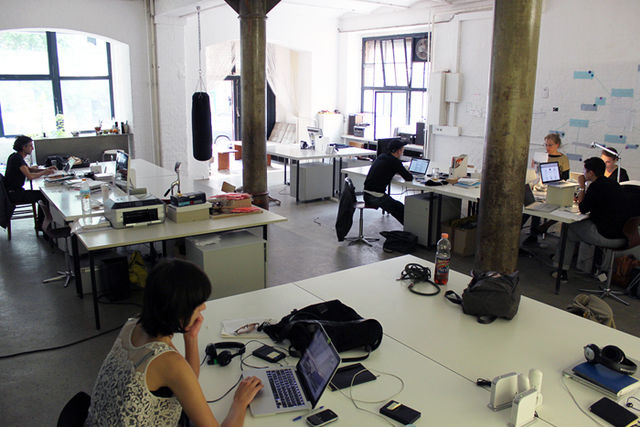Own office Space or Co-working Space. Which one to choose?

Introduction
You can choose a coworking space or a traditional office when deciding where your business will be physically located. Each has advantages and disadvantages, but the best option for your company will depend on its nature, its production objectives, and how customers will view it.
What you need to know if you’re trying to decide between a coworking space and a traditional office space for your company.
Traditional Office Space:
Traditional office spaces are secret headquarters for your business because they are designed for productivity and focus. Although the design may be open like a coworking space, you also have the choice to divide it into individual offices or cubicles. In addition, you have full access to your technology and other resources, and there are designated conference rooms for group meetings. A traditional office is a personal workspace for businesses that enable organizations to operate and accomplish objectives. This office configuration places all essential tasks—from handling administrative work, private meetings, and teamwork—under one roof. To set up a traditional office, businesses must rent a commercial building.
Pros:
- Privacy: Professional, quiet environments with fewer interruptions and scheduling conflicts can be found in office spaces and meeting rooms. A quiet workplace is an essential factor in increasing productivity. Working professionals can find dedicated desks or cubicles in traditional offices, facilitating concentration. Distractions like loud talking or noises are scarce.
- Individual production: Traditional workplaces promote solitary labor rather than networking and collaboration in coworking spaces. Strong relationships among coworkers promote improved teamwork and accelerate organizational development. That’s why companies prioritize fostering a supportive workplace environment. Traditional offices don’t use staff from other companies and operate in complete secrecy. Employees become more familiar with one another in this setting, which helps them work more effectively.
- Professional client-facing setting: Client privacy and confidentiality are upheld. Parking spaces are neglected despite being a crucial component of commercial offices. Anyone visiting the office, whether they are clients, prospects, or staff members of the company, needs a place to park their cars. Lack of parking space can occasionally give off a bad business vibe. Business owners can easily access parking spaces with enough vehicle space at traditional offices. To offer a hassle-free experience, they can lease an office building with a large parking lot.
- Personal branding: Your brand is present throughout the office. A company’s biggest asset is its data. So it makes sense that businesses spend a lot of money protecting company data. However, as digitisation increases, data security concerns are surfacing more frequently. In a traditional workplace, there is no access for unauthorised professionals, giving businesses total control over their workstations. They can keep their data secure and confidential thanks to the privacy factor.
Cons:
- Fewer networking opportunities: There are fewer occasions to meet people outside your industry. A business owner incurs high costs when leasing a conventional workspace. They must construct and maintain amenities like conference rooms, desks, laptops, computers, and more. The investment is pricey and might put them out of business, especially if they are just starting.
- Separation: Individual offices and cubbies put up walls between workers, effectively preventing them from collaborating and talking to one another. Traditional offices require businesses to pay a long-term lease before relocating there. Typically, the lease lasts three or five years. Businesses are not allowed to move into another location after receiving payment. Such an agreement might prevent them from making decisions regarding their workspace.
- Office management duties: Managing an office can divert attention from projects. Traditional office workers don’t have a lot of working flexibility. As a result, their personal life and work balance may become muddled by this rigid work schedule, which can cause stress and low productivity.
- Long-term commitment: Long-term leases are typical for traditional offices. By assisting companies in creating beneficial business relationships, networking can increase ROI. Additionally, it can assist workers in developing new skills. Unfortunately, traditional workplaces don’t provide many networking opportunities. As a result, the private working environment can cause people to lose out on important business opportunities.
Co-Working Space
Coworking spaces frequently have an open-concept design and are accessible to all members. In addition, the areas are typically furnished with cozy furniture, shared technology like printers and Wi-Fi, and even free coffee to maintain a collaborative and communicative atmosphere. These days, coworking spaces are booming due to their advantages. They support businesses in reducing high costs and concentrating on expansion.
Pros:
- Workspace variety: People are free to move around in coworking spaces. The lack of modern amenities in the workplace can affect workers’ productivity. Coworking spaces have top-notch amenities and infrastructure. They provide all the necessities for a productive workplace.
- Opportunities for collaboration and networking abound: You may get to interact with people you might not have otherwise. The profit margins of businesses can be increased with lower overhead expenses. Business owners can save a ton of money on office maintenance because coworking spaces share amenities. Together with other coworking businesses, they can split the costs. They can use their budget effectively with the aid of this strategy. Therefore, coworking has the potential to significantly improve the bottom line over the long term, particularly if they are a growing company.
- Nothing extra was spent: Your fee includes all expenses, including those for furnishings, renovations, and utilities. There are no significant upfront expenses or binding commitments. You can pay monthly or select a different plan depending on your space. For working professionals, a rigid work environment is unhealthy. Burnout may result, which would lower their output. Employees request working flexibility for this reason. Employees can have more work flexibility with coworking.
- Built-in management: You don’t have to be concerned about running the office. For businesses, a long-term lease may present obstacles. Regardless of the circumstance, they are not permitted to breach the lease agreement for a specific period. For instance, a startup won’t receive a refund for the unused office space if it closes down during the COVID-19 pandemic. Business owners can avoid paying such lengthy leases by coworking. According to the employee footprint, they can make monthly payments. Additionally, they gain the ability to adapt quickly to changes.
Cons:
- There are less expensive options: Coworking spaces are still more expensive than working from home or a coffee shop, even though they are typically more affordable than traditional offices.
- Areas that are crowded: The numerous people present may be distracting. Sharing space with other businesses is part of coworking. Workers with creative or administrative job profiles might find the atmosphere annoying. But by choosing private desks, they can reduce distractions. They can support them in concentrating and performing at their best.
- Lack of personal branding: If you want to project a professional brand image, the location may not be the best for a client meeting.
- Unavailable shared spaces: Since you share resources and conference rooms with coworkers, you might not always have access to them. In addition, coworking doesn’t provide a designated parking area, unlike traditional offices. As a result, companies must divulge them into coworking spaces. For businesses, shared parking spaces can be problematic, especially when there is a high volume of customers and potential customers walking around.
Coworking and conventional offices each have advantages and disadvantages. Therefore, the question cannot be specifically answered. Coworking has a great value proposition for startups in their early stages. But that does not imply that well-established companies should disregard coworking. Due to flexible working options, prestigious companies like Amazon and Microsoft have shifted to coworking. On the other hand, coworking may be a better option if you consider future work trends and futuristic thinking. To help your business grow, weigh each option’s advantages and disadvantages and make a thoughtful decision.
Cash flow and Freedom from fiction
Co-working is probably your best option if you’re a solo entrepreneur or a member of a very small team and need a dedicated space for work. Yes, co-working spaces are more expensive than working from home or a coffee shop, but they provide a much more productive environment.
Additionally, your rent will cover the cost of utilities like electricity, high-speed internet, and other expenses like office furniture and renovations. Working in a professional setting without significant upfront costs or long-term commitments is another benefit of co-working spaces.
Facing your Clients
The lack of control over how your clients perceive your company and brand is one of the biggest potential drawbacks of setting up your team in a co-working environment. Although many workspaces, including WeWork, place a high value on design and creating a trendy environment, their attention will be on their brand rather than yours.
That’s why there might be limitations on how much of your space you can customize, even if you have a dedicated office in a coworking setting. Consider the impact that being in a non-dedicated office will have on your clients if your business relies heavily on face-to-face customer interaction.
The majority of co-working spaces provide members with exclusive meeting and conference rooms. Establishing the same level of gravitas as a private office is challenging. Businesses that value confidentiality might find this to be of particular concern. Coworking spaces typically have an open floor plan, which makes it difficult to feel as private as you might in a private office.
Staying Focused
The fact that co-working spaces encourage a socially friendly environment is appealing to many businesses. Other business owners and their teams surround you. In addition, coworking spaces are a hub for networking. These qualities are desirable for many people, but they might not be free.
You have less control over your surroundings and your ability to avoid distractions, for example, in a co-working space. Even though dedicated phone booths for meetings and calls, etc., are common in co-working spaces, most of them place a high value on maintaining a quiet, professional environment, and there is still a greater chance that distractions will surround you than in a private office.
It might be difficult to be as productive as you would in a private office if you have trouble focusing on your work. But keep in mind that many coworking spaces provide free or discounted trials. So, before committing, make sure to test-drive any potential work location.
Which one to choose?
Coworking spaces might be more advantageous if your company is relatively small or if you work alone. These areas are an excellent way to reduce costs and boost output. In addition, coworking spaces are the best option to encourage a creative, collaborative team. There are numerous opportunities for networking, cross-industry collaboration, and team communication.
A private office space might be the best option for a company with a larger team or meeting clients frequently. Traditional office settings emphasize individual productivity, foster a sense of privacy, and are less distracting. Office spaces are excellent for businesses that need people to work on various tasks at various times. The workplace will offer the areas they require to finish their work before coming together to present what they have accomplished.
Before choosing between renting a coworking space or purchasing/leasing an office, there are several factors to consider. First, consider how you want to market your company to potential customers, how your staff will operate and be most productive, and which option will be most affordable.
CO— aims to provide you with motivation from eminent, reputable experts. However, you should speak with a specialist who can give you advice based on your particular situation before making any business decisions.
Conclusion
Your particular operation will determine whether a co-working space or a private office is best for you and your company. When choosing an office, the most important things to consider are your need for easy scalability, the impression you want to make on clients, and the type of working environment you believe would be best for your daily tasks.
There may not be a single correct answer; after all, we started in a co-working environment only to discover that, as our company grew, it made more sense to move our headquarters to a private office. As your business evolves, so will what you require from your surroundings. The best ways to ensure you’re in the right place are to keep an open mind and maintain a mindset of self-evaluation.



